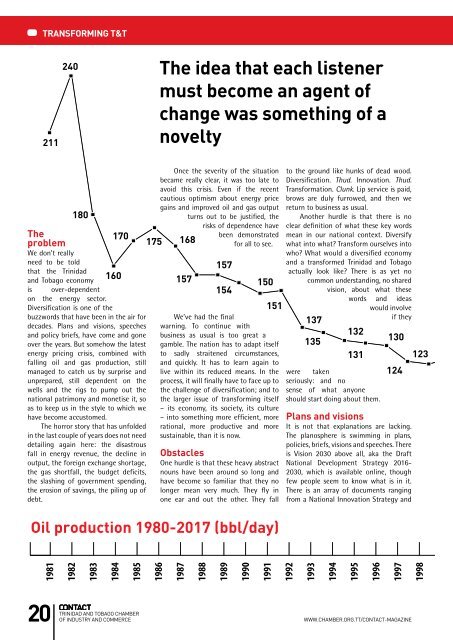CONTACT Magazine (Vol.18 No.1 – April 2018)
The first issue of the rebranded CONTACT Magazine — with a brand new editorial and design direction — produced by MEP Publishers for the Trinidad & Tobago Chamber of Industry & Commerce
The first issue of the rebranded CONTACT Magazine — with a brand new editorial and design direction — produced by MEP Publishers for the Trinidad & Tobago Chamber of Industry & Commerce
Create successful ePaper yourself
Turn your PDF publications into a flip-book with our unique Google optimized e-Paper software.
transforming t&T<br />
211<br />
240<br />
The idea that each listener<br />
must become an agent of<br />
change was something of a<br />
novelty<br />
180<br />
The<br />
problem<br />
We don’t really<br />
need to be told<br />
that the Trinidad<br />
170<br />
160<br />
and Tobago economy<br />
is over-dependent<br />
on the energy sector.<br />
Diversification is one of the<br />
buzzwords that have been in the air for<br />
decades. Plans and visions, speeches<br />
and policy briefs, have come and gone<br />
over the years. But somehow the latest<br />
energy pricing crisis, combined with<br />
falling oil and gas production, still<br />
managed to catch us by surprise and<br />
unprepared, still dependent on the<br />
wells and the rigs to pump out the<br />
national patrimony and monetise it, so<br />
as to keep us in the style to which we<br />
have become accustomed.<br />
The horror story that has unfolded<br />
in the last couple of years does not need<br />
detailing again here: the disastrous<br />
fall in energy revenue, the decline in<br />
output, the foreign exchange shortage,<br />
the gas shortfall, the budget deficits,<br />
the slashing of government spending,<br />
the erosion of savings, the piling up of<br />
debt.<br />
Once the severity of the situation<br />
became really clear, it was too late to<br />
avoid this crisis. Even if the recent<br />
cautious optimism about energy price<br />
gains and improved oil and gas output<br />
turns out to be justified, the<br />
risks of dependence have<br />
been demonstrated<br />
for all to see.<br />
175 168<br />
157<br />
157<br />
154<br />
150<br />
151<br />
We’ve had the final<br />
warning. To continue with<br />
business as usual is too great a<br />
gamble. The nation has to adapt itself<br />
to sadly straitened circumstances,<br />
and quickly. It has to learn again to<br />
live within its reduced means. In the<br />
process, it will finally have to face up to<br />
the challenge of diversification; and to<br />
the larger issue of transforming itself<br />
<strong>–</strong> its economy, its society, its culture<br />
<strong>–</strong> into something more efficient, more<br />
rational, more productive and more<br />
sustainable, than it is now.<br />
Obstacles<br />
One hurdle is that these heavy abstract<br />
nouns have been around so long and<br />
have become so familiar that they no<br />
longer mean very much. They fly in<br />
one ear and out the other. They fall<br />
to the ground like hunks of dead wood.<br />
Diversification. Thud. Innovation. Thud.<br />
Transformation. Clunk. Lip service is paid,<br />
brows are duly furrowed, and then we<br />
return to business as usual.<br />
Another hurdle is that there is no<br />
clear definition of what these key words<br />
mean in our national context. Diversify<br />
what into what? Transform ourselves into<br />
who? What would a diversified economy<br />
and a transformed Trinidad and Tobago<br />
actually look like? There is as yet no<br />
common understanding, no shared<br />
vision, about what these<br />
words and ideas<br />
would involve<br />
if they<br />
137<br />
135<br />
132<br />
131<br />
were taken<br />
seriously: and no<br />
sense of what anyone<br />
should start doing about them.<br />
130<br />
124<br />
Plans and visions<br />
It is not that explanations are lacking.<br />
The planosphere is swimming in plans,<br />
policies, briefs, visions and speeches. There<br />
is Vision 2030 above all, aka the Draft<br />
National Development Strategy 2016-<br />
2030, which is available online, though<br />
few people seem to know what is in it.<br />
There is an array of documents ranging<br />
from a National Innovation Strategy and<br />
123<br />
12<br />
Oil production 1980-2017 (bbl/day)<br />
1981<br />
1982<br />
1983<br />
1984<br />
1985<br />
1986<br />
1987<br />
1988<br />
1989<br />
1990<br />
1991<br />
1992<br />
1993<br />
1994<br />
1995<br />
1996<br />
1997<br />
1998<br />
1999<br />
20<br />
Trinidad<br />
and Tobago Chamber<br />
of Industry and Commerce<br />
www.chamber.org.tt/contact-magazine


















